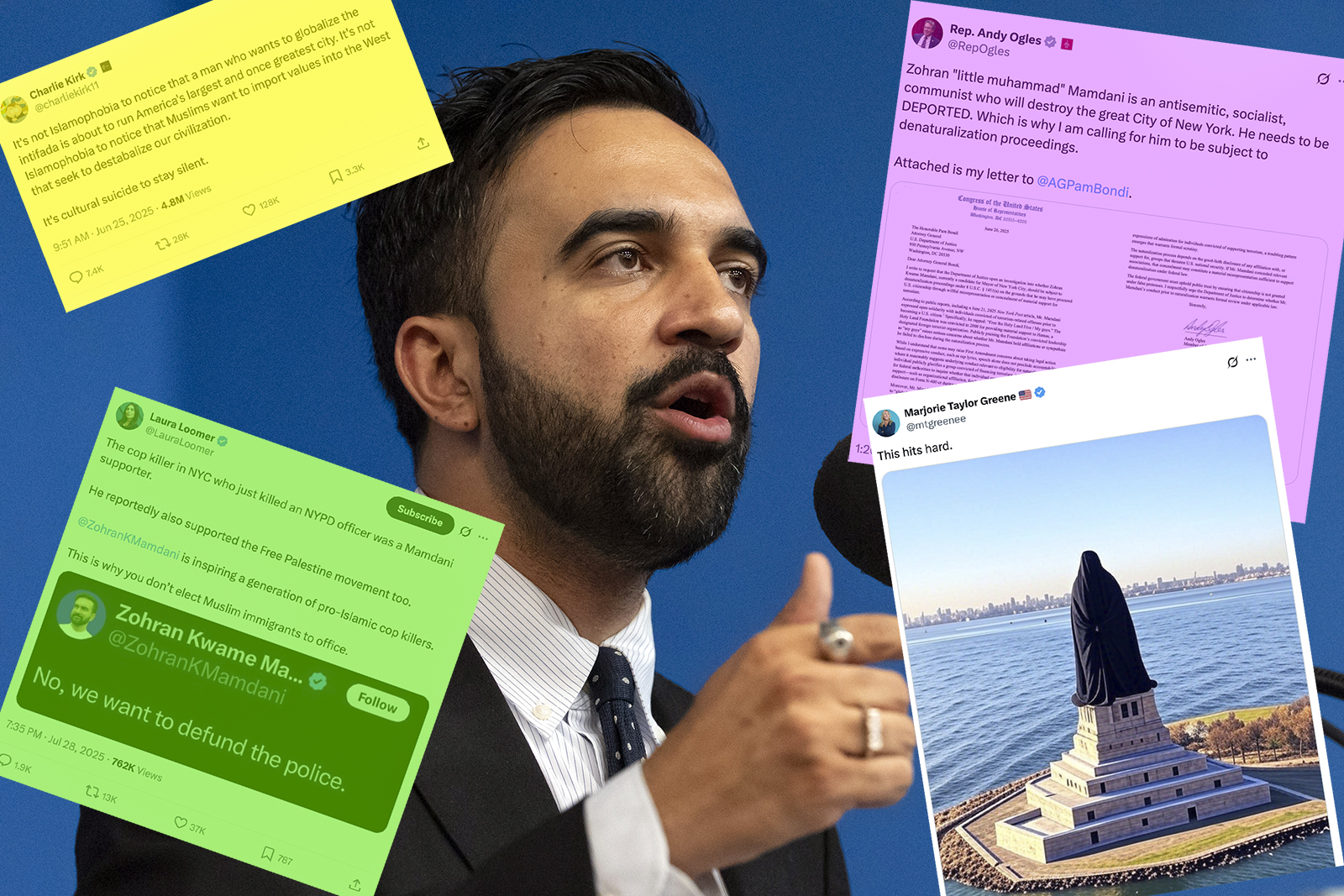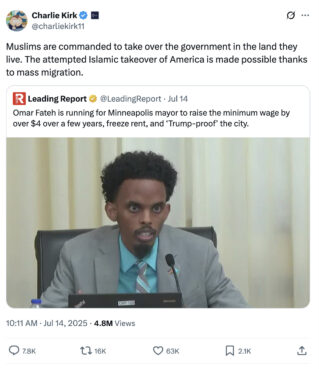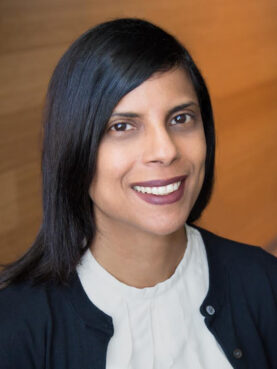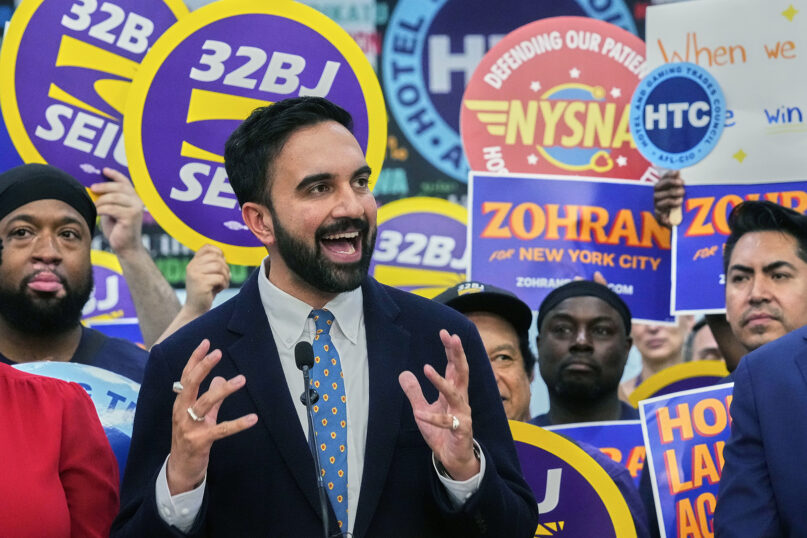
(RNS) — Since Zohran Mamdani’s victory in the New York City Democratic mayoral primary in June, conspiracy theories involving his Muslim faith have ranged from highly questionable to bizarre.
One theory was that he plans to introduce radical Islam to the city. A stranger one was that he was culpable in the shooting deaths of four people in a Park Avenue office building on July 28. Neither theory has been supported by evidence.
“The cop killer in NYC who just killed an NYPD officer was a Mamdani supporter,” Laura Loomer, the far-right commentator and adviser to President Donald Trump, posted on X. “@ZohranKMamdani is inspiring a generation of pro-Islamic cop killers. This is why you don’t elect Muslim immigrants to office.”
Charlie Kirk, CEO of Turning Point USA, a conservative Christian organization, said Mamdani’s victory signaled a takeover of Western values by Muslims.
“It’s not Islamophobia to notice that Muslims want to import values into the West that seek to destabalize our civilization. It’s cultural suicide to stay silent,” Kirk wrote in a June 25 X post.
The same day, U.S. Rep. Marjorie Taylor Greene, R-Ga., posted on X a picture of the Statue of Liberty covered in a black burqa. Her colleague Rep. Andy Ogles, a Republican from Tennessee, called Mamdani “Zohran ‘little muhammad’ Mamdani” in an X post questioning his path to citizenship and calling for his deportation.

A Charlie Kirk post on X about Minneapolis mayoral candidate Omar Fateh. (Screen grab)
Such attacks mirror those aimed at Omar Fateh, a democratic socialist candidate running for mayor in Minneapolis. After the city’s Democratic Farmer-Labor Party convention endorsed Fateh — who, like Mamdani, is Muslim — Kirk said on X that Muslims were “commanded to take over the government in the land they live,” adding, “the attempted Islamic takeover of America is made possible thanks to mass immigration.” Fateh was born in Washington, D.C., and is the son of Somali immigrants.
In North Texas, the East Plano Islamic Center, known as EPIC, a mosque seeking to establish a Muslim-centric community, has faced accusations claiming the group seeks to impose Shariah, or Islamic religious law, in the state.
Unsupported claims attributing a radical religious agenda to prominent Muslims are an attempt to discredit their political ambitions, said author Wajahat Ali, who is Muslim and writes about Islamophobia. Such accusations trace back to post-9/11 Islamophobic tropes, presenting Muslim beliefs as a threat to America, he said.
These kinds of claims are now seeing a resurgence as public Islamophobic statements and incidents have increased after the Oct. 7, 2023, Hamas attacks on Israel and the ensuing Israel-Hamas war. As anti-Shariah rhetoric gains ground in a more online way than in the past, Muslim advocates fear consequences for their communities across the country. Muslim activist groups are also alarmed by decreased hate speech moderation on platforms such as X, which facilitates the spread of such claims.
“This is a reboot of a fearmongering story that was mainstream in 2010. … Now, they have rebooted it because of Zohran Mamdani, Rashida Tlaib, Ilhan Omar and also the Minnesota state senator, Omar Fateh,” Ali said. “It’s an age-old playbook to do a divide and conquer, to have Americans fear.”
RELATED: Zohran Mamdani is running to be New York mayor. How his Muslim faith stirred the race
Shariah, which translates to “way” or “path” in Arabic, is understood to reflect how God expects Muslims to live their lives, said Asifa Quraishi-Landes, a law professor at the University of Wisconsin-Madison who specializes in the comparative study of U.S. constitutional law and Islamic law.
Anti-Shariah campaigns flatten what Shariah represents for Muslims, said Khaled Beydoun, a law professor at Arizona State University, who called it a complex religious concept that can’t be reduced to a set of laws.
“Shariah law, like American constitutional law, is very heterogeneous,” he said. “It’s very complex. It’s very layered. There’s a lot of conflict and competing ideas as to what Shariah law is among Muslims.”
Election cycles have long coincided with a surge of inflammatory anti-Muslim speech, said Saher Selod, director of research at the Institute for Social Policy and Understanding in Dearborn, Michigan, which researches American Muslims.

Saher Selod. (Photo courtesy ISPU)
“Muslims definitely are cognizant of this increased rhetoric that comes along with any election cycle and what it means for their safety,” she said.
The often conservative voices crusading against Shariah typically depict Islam as an ideology that seeks to control all aspects of social life, rather than a religion.
“The stereotype is that Muslims are a threat,” Selod said. “It keeps a population fearful that Muslims are coming, and they’re going to change American law. They’re going to change the way Americans live their life through taking over our laws and policies.”
The discourse is also grounded in assuming Muslims hide their intentions. For example, in an early July post, Loomer warned her followers about Taqiyya, a concept from the medieval Islamic era referring to concealing one’s beliefs to avoid danger. She said it “permits Muslims to lie about everything for the sake of advancing Islam.”
“They mystified Taqiyya as religiously mandated lying — that Muslim Americans are commanded to lie,” Ali said of critics. “So, even the moderate Muslims couldn’t be trusted because their goal is to implement Shariah.”
Legal efforts to ban Shariah gained traction after Park51, an Islamic community center and mosque, was proposed to open in lower Manhattan in 2010. Referred to as the “Ground Zero mosque” by opponents due to its proximity to the Twin Towers terrorist attack, it was the site of many protests led by anti-Muslim activist Pamela Geller. The mosque became a hot-button issue in the 2010 midterm elections, with many candidates pledging to combat alleged Shariah in the U.S.
In 2012, unsupported theories that President Barack Obama was secretly Muslim and born in Kenya took over discussions during his second presidential election, prompting him to present his long-form birth certificate.
According to a 2018 Southern Poverty Law Center report, 201 anti-Shariah bills have been introduced in 43 states since 2010. The texts usually defined Shariah as a “legal-political-military” doctrine.
The anti-Shariah movement gained prominence after 9/11, but such rhetoric dates back to the 1990s.
“When 9/11 came along … (there) was already a baseline of anti-Muslim sentiment in the U.S., and this obviously coalesced everything,” said Lawrence Pintak, a Washington State University professor in the communications department and author of the 2019 book “America & Islam: Soundbites, Suicide Bombs and the Road to Donald Trump.”
The Investigative Project on Terrorism, a nonprofit research group created by Steven Emerson in 1995, researched links between American Muslims and Islamist terrorism. It fueled Islamophobic campaigns through the 2010s, as a network of anti-Muslim organizations began to emerge.
In 2009, IPT members organized a campaign against the opening of the Islamic Center of Murfreesboro in Tennessee. The mosque drew opposition from such figures as Pat Robertson, the Christian Broadcasting Network founder, and Frank Gaffney, founder of the Center for Security Policy, which led anti-Shariah legislation efforts in the 2010s.


